Solving the mystery behind an Apache hunters death overturns assumptions about Apache battlefield behavior.

On May 5, 1871, Sgt. John Mott and three others followed Apache footprints, tracking what they thought were the incautious wanderings of an inattentive Apache woman and her mount toward an unsuspecting ranchería. The rocky fringe of the mountainous heights and the boulder-strewn canyon lay before them. These did not register as warning signs because this was a few years before the U.S. Cavalry had learned to fight Chiricahua Apaches.
Scouting across a portion of southeastern Arizona Territory from Camp Lowell, this detachment from Troop F, 3rd Cavalry was searching for Apache trails under the leadership of Lt. Howard B. Cushing.
“He was considered the most successful Indian fighter in the army; brave, energetic and tireless, he followed the foe to their strongholds and there attacked them with vigor and spirit, dealing them blows the savages could not withstand,” Thomas Edwin Farish reported of Cushing in History of Arizona.
Little did Cushing and his men know that they themselves were being stalked by their foe, who were more formidable than this storied Apache hunter had previously encountered.
Heading north from the Huachuca Mountains, the cavalry intended to stay over at the decommissioned Camp Wallen along the Babocomari River. The Apaches, however, had burned the grass, requiring, as intended, that the troops head 12 miles north to Bear Springs in the Whetstone Mountains, the next-nearest reliable water source. Just north of Camp Wallen, seemingly fortuitously, they encountered Apache footprints.
Mott’s small detachment recognized the pending ambush just as they entered a wash. This prematurely snapped trap was followed by an advance of eight men, including Cushing, who found his way into herodom, falling in battle with civilian packer William H. Simpson and Pvt. Martin Green.
هذه القصة مأخوذة من طبعة December 2018 من True West.
ابدأ النسخة التجريبية المجانية من Magzter GOLD لمدة 7 أيام للوصول إلى آلاف القصص المتميزة المنسقة وأكثر من 9,000 مجلة وصحيفة.
بالفعل مشترك ? تسجيل الدخول
هذه القصة مأخوذة من طبعة December 2018 من True West.
ابدأ النسخة التجريبية المجانية من Magzter GOLD لمدة 7 أيام للوصول إلى آلاف القصص المتميزة المنسقة وأكثر من 9,000 مجلة وصحيفة.
بالفعل مشترك? تسجيل الدخول
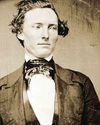
FIREARMS COLT WALKER 47
THE LEGENDARY HANDGUN THAT REALLY WON THE WEST
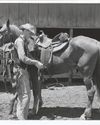
HERITAGE TRAVE
THE AMERICAN WEST IN ALL ITS GLORY OUR ANNUAL FAVORITES LIST CELEBRATES DESTINATIONS ACROSS THE WESTERN UNITED STATES.
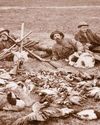
Wild Turkey, and Not the Drinkin' Kind
The actual bird was a favorite of pioneers.
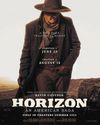
THE PASSION PROJECTS OF THE MODERN WESTERN
A YEAR OF UNDERRATED EXCELLENCE
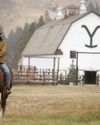
WESTERN BOOKS THEN AND NOW
THE STATE OF WESTERN HISTORY AND FICTION PUBLISHING IN 2024 IS ONE OF GRIT AND DETERMINATION.
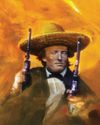
SAMUEL WALKER VALIANT WARRIOR
While a prisoner at the castle of Perote, Walker was put to work raising a flagpole. At the bottom of the hole, Walker placed a Yankee dime, vowing to someday come back and retrieve it, at the same time exacting revenge on his Mexican captors. In the summer of 1847, when Walker's mounted riflemen returned and routed Santa Anna's guerillas, the young captain kept his promise and got his dime back.
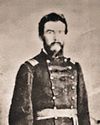
THE BATTLE OF CENTRALIA
ON September 27, 1864, Bloody Bill Anderson and about 80 men took over the small railroad village of Centralia, looting stores and discovering a barrel of whiskey that they hauled out into the street. Wild enough when sober, they soon were roaring drunk.
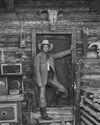
THE MAN WHO SHOOTS THE WEST
Jay Dusard is a living American photographer who has made Arizona his home for over 60 years, seeing it first in 1960 on a visit, moving here for good in 1963.
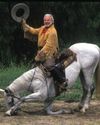
A TRUE WESTERNER INDEED PHIL SPANGENBERGER 1940-2024
Spangenberger had Nevada trained to bow by the legendary horse trainer, Glenn Randall, who trained Roy Rogers' Trigger, Gene Autry's Champion, Rex Allen's Koko and the Ben Hur chariot horses, among other great equines.

Where Did the Loot Go? - This is one of those find the money stories. And it's one that has attracted treasure hunters for more than 150 years.
Whatever happened to the $97,000 from the Reno Gang's last heist? Up to a dozen members of the Reno Gang stopped a Jeffersonville, Madison and Indianapolis train at a watering station in southern Indiana. The outlaws had prior intelligence about its main load: express car safes held about $97,000 in government bonds and notes. In the process of the job, one of the crew was killed and two others hurt. The gang made a clean getaway with the loot.